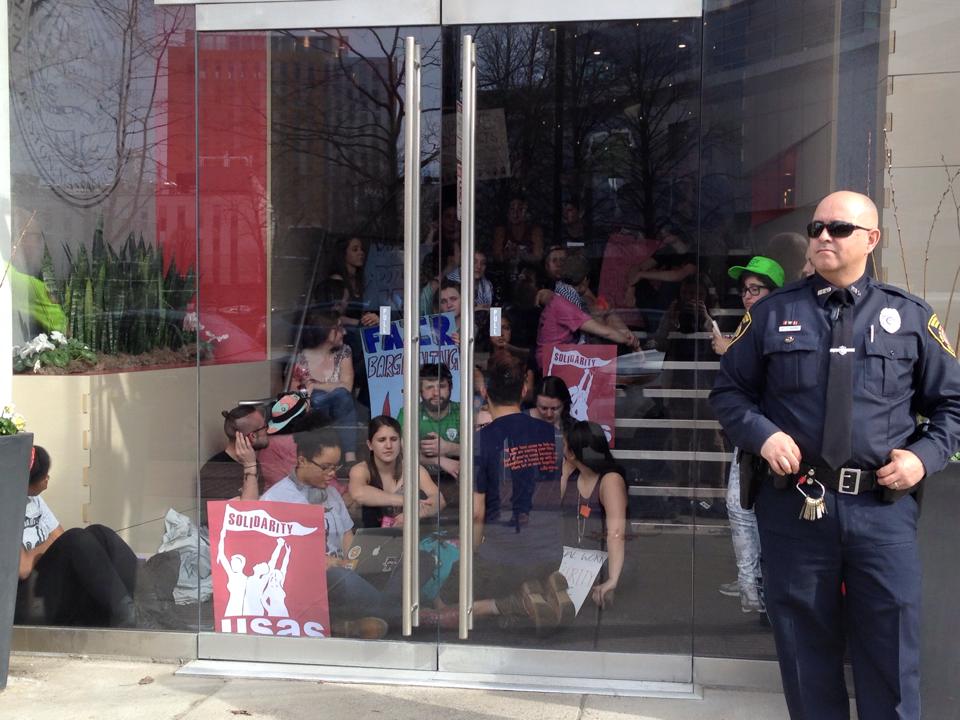By Varun Goyal, news correspondent
In light of the movements to increase wages to $15 for all minimum wage employees and fair salaries for adjunct faculty, student activists held two events on Tuesday, April 14.
The first was a sit-in at 716 Columbus Ave., where around 30 students from the Empowered Adjunct Community Coalition of Northeastern University gathered to emphasize the importance of raising wages for adjunct professors.
“We’re paying the same tuition for courses no matter which professor is teaching them, and we’re earning the same credits regardless of the professor,” freshman undeclared student Richard Faletto said. “The administration holds adjunct professors to the same exact standard of excellence, and thus should be paid equally as their colleagues.”
Students initially planned to gather together for a sit-in outside President Joseph E. Aoun’s office. When they weren’t allowed to go up to the office, they decided to sit downstairs in the building and protest there to get their message across. Although these students have been gaining support as they have spread awareness, they had not received much response from administrators.
“The administration has seemed to completely ignore our letter deliveries, giving us no response,” Faletto said. “This was the only option that the administration left us with.”
Eventually, after two hours of protesting, Vice President of Student Affairs Madeleine Estabrook came and told the protesting students that Aoun was out of the country and unreachable. However, she offered to meet with up to four students. The students turned down the offer.
“There’s no reason to exclude students from the meeting,” Faletto said. “Everyone should be able to participate in the meetings.”
The fact that Estabrook came down to speak was a major accomplishment for the coalition, showing that administrators are becoming more aware of the situation.
The second event Tuesday saw was a collective rally composed of students and faculty members from different universities in the Boston area. They protested to help those who cannot simply make ends meet with the current minimum wage of $9, though it will have increased to $11 in Massachusetts by July 2016.
“People must choose to either pay rent or feed their families,” sophomore health sciences major Evan Jacobson said over a text to The News. “There are a lot of people in perpetuated cycles of poverty, and this negates the American Dream.”
Those most affected by the low minimum wage are middle-aged workers of color, illustrating that racial injustice is tied to economic inequality, according to Jacobson.
“Increasing the minimum wage and job stability is a step towards fighting systems of oppression that work against people of color in this country,” Jacobson said.
The majority of Northeastern students voted in a referendum last week that the minimum wage should be increased to $15 for all campus employees. However, that doesn’t mean that the administration will support the majority and increase the wage.
“When the administration doesn’t take the popular student vote into account, it tells us that administrators have other priorities that are not in line with those of the student body, staff and adjunct faculty that make up the heart and soul of this institution,” Jacobson said.
Cities like San Francisco and Seattle have passed a law that allows the minimum wage to increase by $1 each year. Tuesday’s rally, organized by the Service Employees International Union, represented an effort to bring that law to Boston. Although the movement was held nationally held on April 15, the city of Boston rallied a day earlier out of respect for the two-year anniversary of the Boston Marathon Bombing.
“I’ve been to a lot of rallies, and this was a huge one,” senior anthropology major Sean Hansen said. “It was a great feeling. At one point, I was able to get up above the crowd, and I looked back and I couldn’t see the end.”
While there has not been any official response regarding the sit-in and rally, these events are raising a great deal of awareness.
“I believe that by all of these campaigns getting more awareness, students will be able to make tangible demands that will be difficult to ignore,” Faletto said.









